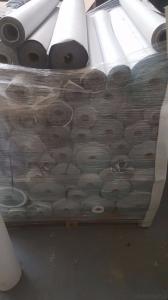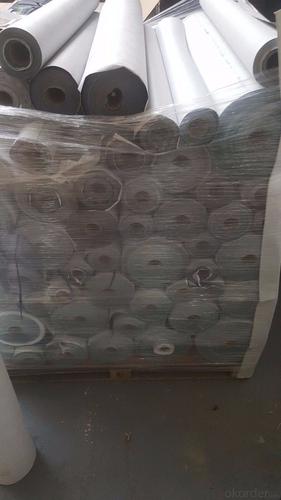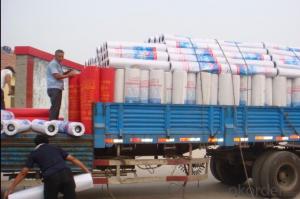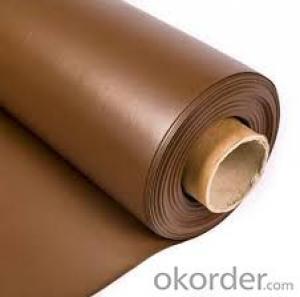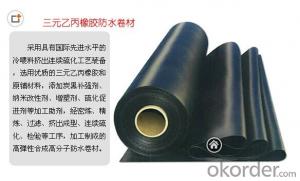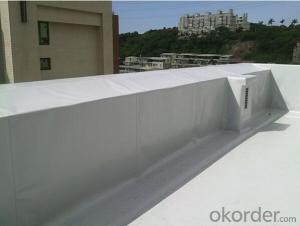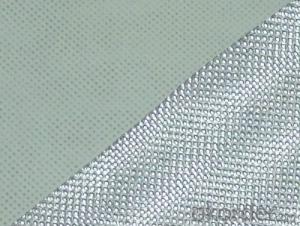Waterproof breathable membrane Used for metal roofs
- Loading Port:
- SHANGHAI
- Payment Terms:
- TT OR LC
- Min Order Qty:
- 500 m²
- Supply Capability:
- 100000 m²/month
OKorder Service Pledge
OKorder Financial Service
You Might Also Like
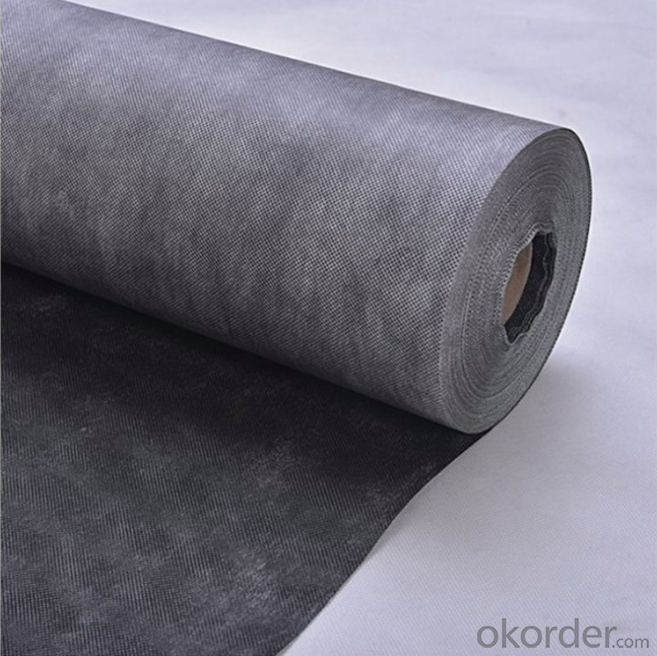
Product Feature:
Air open & vapour permeable
More breathable than any other 'air open' underlay on the market
Lowest vapour resistance of all breathable membranes
Being both air open & vapour permeable further minimises the risk of condensation forming
No ventilation required
Strong 3 layer material
Superior nail tear strength
| Mass per unit area: | 140g/m2 |
| Product Type: | Waterproofing Breathable Bembrane For House Wrapping |
| Material: | PP/PE granule |
| Tensile Strength(MD/XD): | 190N/5cm(+-20%)/150N/5cm(+-20%) |
| Resistance to tearing(MD/XD): | >50N/50N |
| Flexibility at low temperature: | (-)24°C |
| Resistance to water pentration: | W1 |
| Temperature resistance | (+)70°C |
| Resistance to UV | 3momths |
| Loading quantity | 40' HC ---2000rolls |
Our company :
our company is a leading professional manufacturer in China, which locates in Yangzhou State-grade Development Zone,Yangzhou City, Jiangsu Province, nearby Shanghai.
We have advanced production lines with the technology from Italy and Germany, which are applied to nonwoven products, film lamination, roofing materials, disposable medical products, packaging materials and so on.Main products:Nonwoven fabric , SMS, SMMS and manufactured productsFilm or foil laminated products Roofing membrane, flooring underlayPE woven fabric, PE tarpaulin, vapor barrierGreenhouseWe not only have first-class processing line, but have first-grade quality management. We have been qualified by ISO9001 (quality) and CE, this system can supply active way to guarantee the quality. We have exported to many countries, such as Canada, USA, Chile, Argentina, New Zealand, Australia, Malaysia, Japan, Ukraine, Latvia, Slovenia, Slovakia, Spain, CZ, Russia, Croatia, Bulgaria, Romania, Italy, UK, Germany, Greece and so on. With a group of excellent senior management and hi-tech R& D personnel and our skilled workers, we can supply you the goods with competitive prices and better quality. We look forward to establish friendly and long term relationship with you in the near future.
FAQ:
1. who are we?
We are based in Jiangsu, China, start from 2008,sell to Eastern Europe(18.00%),Southern Europe(15.00%),Northern Europe(15.00%),Western Europe(12.00%),South Asia(6.00%),Eastern Asia(5.00%),Oceania(5.00%),Central America(5.00%),Southeast Asia(5.00%),North America(3.00%),South America(3.00%),Africa(3.00%),Domestic Market(3.00%),Mid East(2.00%). There are total about 11-50 people in our office.
2. how can we guarantee quality?
Always a pre-production sample before mass production;
Always final Inspection before shipment;
3.what can you buy from us?
Breathable Membrane, Reflection Breathable Membrane, Housewrap, Vapor Barrier, Heat Insulation Film
4. why should you buy from us not from other suppliers?
We not only have first-class processing line, but have first-grade quality management. We have been qualified by ISO9001 (quality) and CE, this system can supply active way to guarantee the quality. We have exported to many countries, such as Canada, USA,
5. what services can we provide?
Accepted Delivery Terms: FOB,CFR,CIF,EXW;
Accepted Payment Currency:USD,EUR,JPY,CAD,HKD,CNY;
Accepted Payment Type: T/T,L/C,Credit Card,PayPal,Western Union,Cash;
- Q: Can waterproofing membranes be used on swimming pool decks?
- Swimming pool decks can indeed benefit from the use of waterproofing membranes. These membranes are specifically designed to act as a barrier against water infiltration, making them an excellent solution for areas that are constantly exposed to water, such as swimming pool decks. By applying a waterproofing membrane to the surface of the deck, it effectively prevents any water from seeping through and causing harm to the underlying structure. Moreover, waterproofing membranes also offer protection against chemicals, UV rays, and general wear and tear, which are commonly encountered in swimming pool environments. All in all, incorporating waterproofing membranes on swimming pool decks can extend their lifespan, decrease maintenance expenses, and elevate the overall safety and appearance of the space.
- Q: Can a waterproofing membrane be used for a commercial building roof?
- Yes, a waterproofing membrane can be used for a commercial building roof. Waterproofing membranes are commonly used in commercial buildings to protect the roof from water damage and leaks. These membranes are typically made from synthetic materials such as PVC or EPDM, which are highly durable and resistant to water penetration. They are installed as a protective layer on the roof surface, effectively preventing water from seeping through and causing damage to the building. Additionally, waterproofing membranes are designed to withstand various weather conditions, including heavy rain, snow, and UV exposure, making them suitable for commercial buildings that are exposed to harsh environmental elements. The use of a waterproofing membrane is an effective and long-lasting solution for ensuring the integrity and longevity of a commercial building roof.
- Q: Can waterproofing membranes be used on mechanical equipment rooms?
- Yes, waterproofing membranes can be used on mechanical equipment rooms. These membranes are designed to provide a protective barrier against water intrusion and prevent moisture damage to the underlying structures. Mechanical equipment rooms, which often house sensitive and expensive equipment, can benefit from the installation of waterproofing membranes to ensure the longevity and functionality of the machinery. By applying waterproofing membranes to the walls, floors, and ceilings of these rooms, it helps prevent water leaks, moisture buildup, and potential damage caused by water infiltration. This can be particularly important in areas prone to heavy rainfall, high humidity, or where the water table is high. Waterproofing membranes can also help in controlling condensation and preventing mold growth, which can be detrimental to the performance of mechanical equipment. Overall, the use of waterproofing membranes in mechanical equipment rooms is a practical and effective solution to protect the equipment and maintain their optimal performance.
- Q: What are the potential drawbacks or limitations of using a waterproofing membrane?
- Some potential drawbacks or limitations of using a waterproofing membrane include the potential for installation errors, which can lead to leaks and water infiltration. The membranes can also be prone to damage from sharp objects or heavy foot traffic, requiring regular maintenance and inspections. Additionally, waterproofing membranes may not be suitable for certain applications or environments, such as areas with extreme temperatures or chemical exposure.
- Q: Are waterproofing membranes resistant to chemical solvents?
- Yes, waterproofing membranes are generally resistant to chemical solvents. They are designed to provide a barrier against water and other liquids, including chemical solvents, to prevent leakage and damage to the underlying structure.
- Q: Are waterproofing membranes suitable for balconies and terraces?
- Yes, waterproofing membranes are suitable for balconies and terraces. These membranes are specifically designed to provide a protective barrier against water and moisture, preventing any potential damage to the structure of the balcony or terrace. Waterproofing membranes are typically made of materials such as rubber, bitumen, or PVC, which are highly resistant to water penetration. They are applied as a liquid, sheet, or spray, creating a seamless layer that covers the entire surface of the balcony or terrace. This ensures that no water can seep through and cause any structural issues, such as cracks, leaks, or deterioration. Additionally, waterproofing membranes can also protect against other forms of damage, such as mold growth or corrosion. Overall, using waterproofing membranes on balconies and terraces is an effective and recommended solution for maintaining their longevity and structural integrity.
- Q: Are waterproofing membranes suitable for residential applications?
- Indeed, residential applications can benefit greatly from the use of waterproofing membranes. These membranes find widespread use in a variety of residential construction areas, including basements, foundations, roofs, bathrooms, and balconies. Their primary purpose is to safeguard the building structure by preventing water penetration and moisture damage. Waterproofing membranes function as a barrier that effectively blocks water from infiltrating the structure, thereby averting problems such as mold growth, rot, or structural deterioration. These membranes commonly consist of materials such as bitumen, PVC, EPDM, or polyurethane, which possess exceptional water-repelling properties. During the construction or renovation process of residential buildings, waterproofing membranes are typically installed. They can be applied in the form of liquid coatings or sheets that are meticulously laid down and firmly affixed to the surface. These membranes create a seamless and long-lasting barrier that can withstand the test of time. Moreover, waterproofing membranes offer numerous advantages for residential applications. They help maintain a dry and comfortable living environment by preventing water leaks and dampness. As a result, they safeguard the integrity of the building materials, extend the lifespan of the structure, and minimize the likelihood of expensive repairs. Furthermore, these membranes contribute to enhanced energy efficiency by reducing heat loss or gain caused by moisture infiltration. By effectively blocking water, they assist in maintaining consistent temperatures inside the house, which leads to reduced energy consumption and lower utility bills. In conclusion, waterproofing membranes are an exceptional choice for residential applications. They provide dependable protection against water damage, enhance the longevity of the structure, and contribute to a healthier and more energy-efficient living environment.
- Q: Can a waterproofing membrane be used for a plaza deck?
- Yes, a waterproofing membrane can be used for a plaza deck. A plaza deck is a flat surface that is usually elevated and exposed to various weather conditions, such as rain, snow, and sunlight. Waterproofing membranes are designed to provide a barrier against water penetration and protect the underlying structure from moisture damage. They are commonly used in outdoor applications, including plaza decks, to prevent water infiltration into the building or structure below. By installing a waterproofing membrane on a plaza deck, it helps to ensure the longevity and durability of the deck, while also providing a safe and dry environment for pedestrians.
- Q: Can a waterproofing membrane be used on precast brick surfaces?
- Precast brick surfaces are vulnerable to water penetration, which can lead to structural damage and the growth of mold or mildew. To prevent this, a waterproofing membrane can be utilized. The membrane, typically composed of rubberized asphalt, modified bitumen, or polyurethane, is a flexible and durable material. It is applied to the surface using a brush or roller, forming a seamless layer that effectively blocks water infiltration into the bricks. Moreover, apart from its water-resistant properties, the waterproofing membrane also enhances the thermal insulation and longevity of the precast brick surfaces. However, it is crucial to ensure that the precast bricks are thoroughly cleaned, dried, and properly prepared prior to the application of the membrane for optimal adhesion and efficacy.
- Q: Can a waterproofing membrane be used in basements?
- Yes, a waterproofing membrane can be used in basements. Waterproofing membranes are commonly used in basements to prevent water infiltration and protect against moisture damage. These membranes are applied to the basement walls and floors to create a barrier that keeps water out, helping to keep the basement dry and prevent issues such as mold and mildew.
Send your message to us
Waterproof breathable membrane Used for metal roofs
- Loading Port:
- SHANGHAI
- Payment Terms:
- TT OR LC
- Min Order Qty:
- 500 m²
- Supply Capability:
- 100000 m²/month
OKorder Service Pledge
OKorder Financial Service
Similar products
Hot products
Hot Searches
Related keywords
